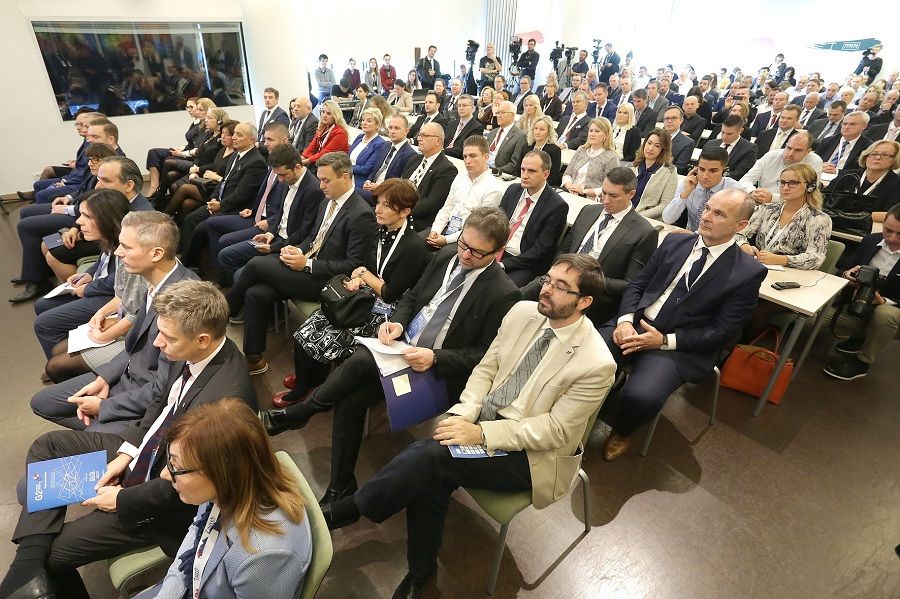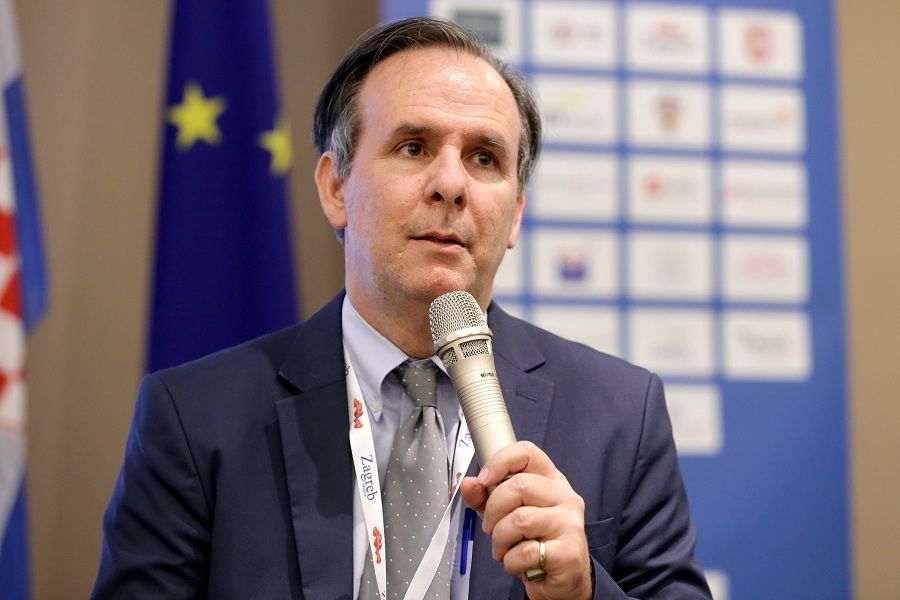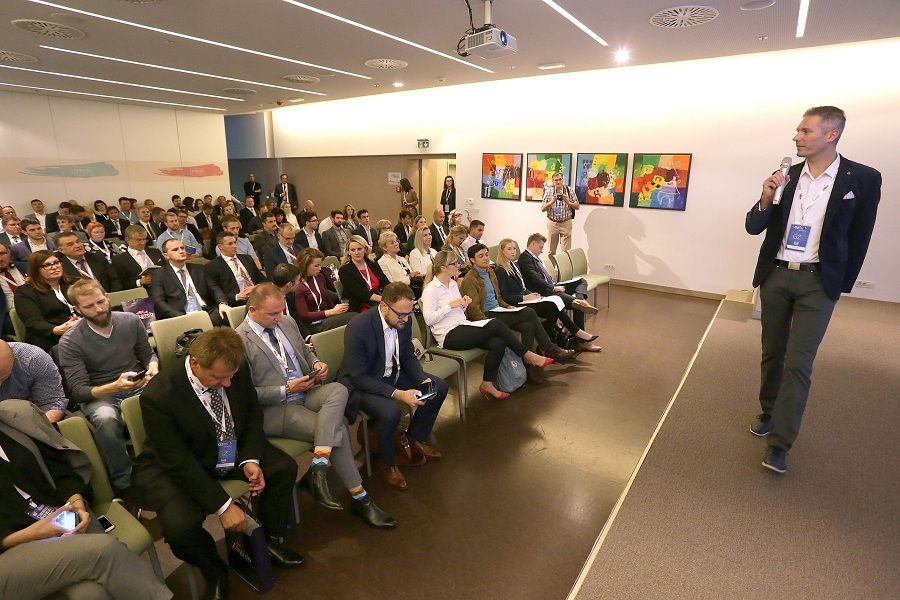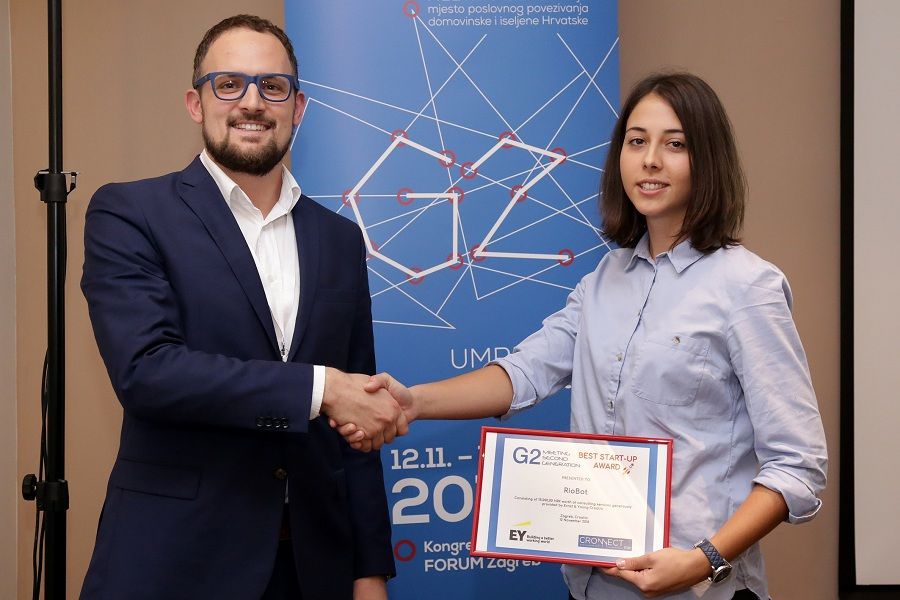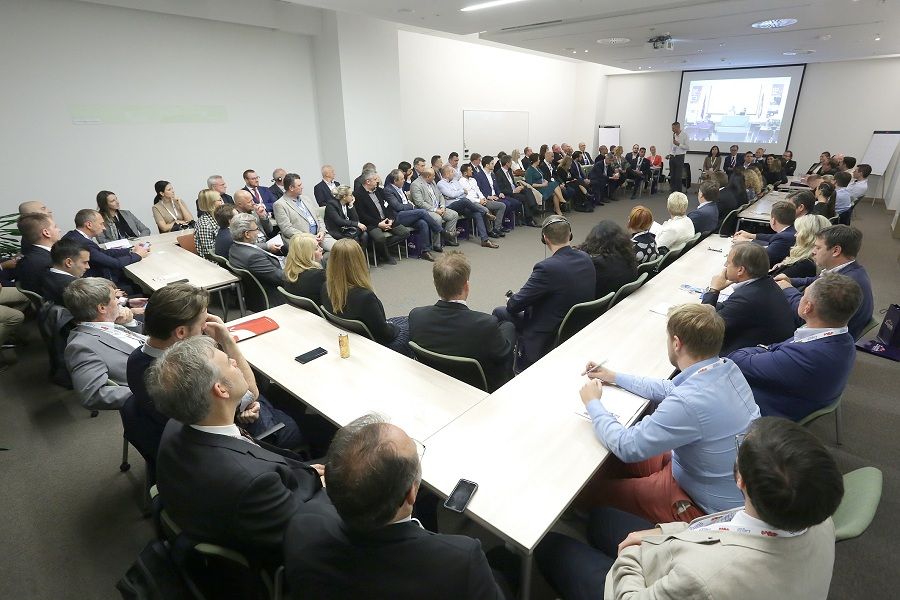Electronic Establishment of Companies Possible in 2019
ZAGREB, November 22, 2018 - The final deadline for making operational the START information system for the online electronic establishment of companies is set for the end of March 2019 for founders of local companies and small businesses, and foreign founders can expect this system in December 2019, according to a decision made by the government.
The START system is being developed as a single information system to electronically start a company, Economy Minister Darko Horvat said.
For starting a business it is currently necessary to make a series of steps and visit several institutions, and some of the steps are to register a new business entity in relevant registries, apply for statistical processes by the national statistical office (DZS), register with the Croatian Health Insurance Fund (HZJZ) and the Croatian Pension Insurance Fund (HZMO), open a bank account and some other steps.
The START system for electronic establishment of companies will network those systems and citizens and entrepreneurs will be able to start their businesses in a digitised way on one spot, Horvat said.
All participants in the system are obliged to ensure automatised communication within the START system.
The system for electronic establishment of companies is expected to become operational for local would-be business owners by 31 March 2019, and for foreigners by 31 December 2019.
A total of 5.5 million kuna is to be set aside for the establishment of the START system.
For more on the business climate in Croatia, click here.
Zlatna Kuna Business Awards Presented
ZAGREB, November 22, 2018 - Karlovac-based arms manufacturer HS Product was voted best large company by the Croatian Chamber of Commerce (HGK) and was presented with the Zlatna Kuna (Golden Marten) Award at a ceremony in Zagreb on Wednesday evening.
The award-giving ceremony brought together many business people and public and political figures, including President Kolinda Grabar-Kitarović, Prime Minister Andrej Plenković, Deputy Prime Minister and Agriculture Minister Tomislav Tolušić, Economy Minister Darko Horvat, Zagreb University Rector Damir Boras, former President of the Croatian Academy of Sciences and Arts Zvonko Kusić, representative of the Speaker of the Croatian Parliament Branko Bačić and Deputy Mayor of Zagreb Olivera Majić.
HS Produkt CEO Željko Pavlin said that the company generates 98 percent of its revenue from exports and innovates its own products. That's why this award belongs to the company's engineers and to all of its employees, he added.
Passenger and charter cargo airline Trade Air received the Zlatna Kuna Award as best medium-size company, while the award for best small company went to IT consulting firm Kod Savjetovanje.
Privredna Banka Zagreb (PBZ) was voted best bank and Croatia Osiguranje best insurance company.
The Microblink computer vision technology company was awarded for innovation, while Photomath, whose mobile application for solving mathematical problems has been downloaded more than 100 million times, was voted best post-startup company.
The lifetime achievement award went to Franco Palma, a prominent professional in the tourist industry.
Zlatna kuna - Grabar-Kitarović: We need more determination, proactivity and optimism
President Grabar-Kitarović said that the event is important for acknowledging those at the forefront of the country's economic development.
As an indicator of the success of Croatian companies, she said that last year they increased the number of employees by 5.8 percent and overall revenues by 9.5 percent, generating a total of 21.9 billion kuna in net profit. She said that Croatian entrepreneurs have proved for decades that they can be successful in all business circumstances and cope with different challenges.
"Just as we recognise these qualities of yours and celebrate your achievements, so we respect the fundamental values and principles that you represent, those being innovativeness, creativity, hard work, commitment, persistence, competence, the values that are deeply rooted in the fabric of the Croatian people," the president said.
She said that she is a great optimist because she knows that Croatia can advance in improving its economy and stand side by side with those countries that are now more developed than it.
"We are wise and smart enough, but we need more determination, proactivity and optimism. My vision of Croatia as a prosperous and functioning state, a competitive economy in which we all work together for the general good and for the wellbeing of every person, remains unchanged and I am ready, in accordance with my powers, to contribute to these goals," Grabar-Kitarović said.
Zlatna kuna - Plenković underlines importance of ICT sector
Prime Minister Plenković said the government based all its economic activities in order to support entrepreneurs and business people and that they rested on fiscal consolidation, structural reforms and attracting investment. "Only in that way can we ensure lasting and sustainable economic growth... and keep up with what we call the foundation of the fourth industrial revolution, i.e. innovation, digitisation and competitiveness."
Plenković said last year's surplus of 3.15 billion kuna showed that the government had planned expenditures and revenues wisely, and that the 1.6 billion kuna surplus in the first half of this year showed that it had continued to do so with the same intensity.
He said the three rounds of the tax reform would relieve the business sector and citizens by 6.3 billion kuna, announcing that the tax relief would continue next year and that businesses would feel it.
Plenković said the digitisation of public administration and the judiciary would continue, and that a new public procurement law would result in more transparent and faster procedures.
He said the government measures had reduced the number of indebted citizens with frozen bank accounts by over 50,000, and that a pension reform was expected to make the system sustainable and more fair and raise pensions.
Speaking of investments, Plenković said this year they reached a record high of 2 billion euro, including 1 billion euro in tourism. He added that tourism must not be the only growing industry and that ICT was a sector in which new steps forward must be made to catch up with the companies and countries at the forefront of global trends.
HGK president Luka Burilović said the digital age had changed communication, doing business and lives, but that he did not agree with announcements that artificial intelligence and robots would take over people's roles. "It's true that the digital transformation will profile the winners and the losers, and which side we will be on depends less on governments and luck and more on us and our ability to accept changes. It's up to us to be their active creator and not a passive observer," he said.
We must decide whether we want to be a country with a rentier economy which loses its population or if we will focus on new technologies, excellence, innovation and quality jobs, he added.
For more on the Croatian Chamber of Commerce, click here.
Another Dismal Assessment of Doing Business in Croatia
ZAGREB, November 21, 2018 - This year's HUP Score, which measures the progress of reforms in 12 key areas for doing business in Croatia, is 37 out of 100 points, one point less than in 2017, the Croatian Employers' Association (HUP) said at a presentation of this index on Wednesday.
"This score shows that we remain at the tail of the European Union. We are its worst performing member," HUP president Gordana Deranja said.
Noting that the HUP had been insisting on reforms all along, Deranja said that reforms would not have a strong effect on the economy if they continued coming from the Ministry of Finance alone.
"Although the score for fiscal consolidation is much better, a strong decline in the score for investment and business barriers and chronic problems relating to the burden on the economy and the labour market have resulted in a fall of the overall score for 2018. In addition to fiscal consolidation, productivity and competitiveness and capital supply also have positive scores," HUP said.
Results show that the best progress has been made in fiscal consolidation (from 54 points in 2017 to 56 in 2018), productivity and competitiveness (from 34 to 45 points) and capital supply (from 36 to 42 points).
On the other hand, the sharpest fall in the score was observed in the score for investment and business barriers, from 35 points in 2017 to 23 points in 2018.
For more on doing business in Croatia, click here.
Foreign Investors Complaining about Business Climate in Croatia
ZAGREB, November 20, 2018 - The head of the Foreign Investors Council, Mladen Fogec, said on Tuesday that the recommendations made by that association were not being implemented and that this year the association wouldn't publish its "White Book" as it made no sense when nothing was implemented. Addressing a conference organised by the Zagreb Initiative and Konrad Adenauer Foundation - Economic Situation and Reform Processes - Croatia and its Surroundings, Fogec warned that reforms were constantly being talked about in Croatia, however, he considers that changes to the business climate in Croatia won't occur soon.
He said that this year, investors had decided not to issue their White Book because it made no sense constantly repeating themselves. "We published it five, six years in a row, repeating the same things each time. Our recommendations are the same and there is no point in repeating them," he said and added that when things start to change and at least some of the recommendations are accepted, they would once again release a new publication.
He announced that instead of publishing the White Book, they would organise an event that will try and analyse what Croatia has lost, due to not attracting foreign investments, or rather the opportunities it has missed.
Assistant Economy Minister Zvonimir Novak believes that Croatia needs investments into technology that will lead to innovations, better cooperation between the real sector and science organisations, more investments made by the private sector in research and development and more innovative products and services.
Investments aren't numbers in the balance sheet. They are investments into economic security, Novak said and added that an economy that is responding to the future has to be driven by the know-how and innovation.
In addition to ICT as a resource, innovation is what almost all economic sectors will have to rely on if they wish to survive on demanding global markets, Novak said, adding that that is why research and development projects are essential.
He underscored the importance of digitisation and said that it was necessary to build a productive economy that is innovative, competitive and stable, while growing sustainably.
For more on business in Croatia, click here.
Companies Awarded for Socially Responsible Practices
ZAGREB, November 20, 2018 - This year's winners of the awards for socially responsible practices are the AD Plastik in the category of big companies, Hipp Croatia in the medium-sized enterprises and Media Val in small businesses, whereas Eko Murvica is the best public company in the field of corporate social responsibility (CSR), according to the results measured by the CSR indices.
These winners and other winners in the CSR categories were presented with the awards at the 10th annual conference on corporate social responsibility in Zagreb on Tuesday.
Addressing the event, Energy and Environment Protection Minister Tomislav Ćorić underscored Croatia's success in meeting goals of the 2030 Agenda for Sustainable Development.
"I will recall that the latest U.N. agenda on sustainable development puts Croatia on the 21st place among 155 countries. This is one of the rankings on which Croatia is among the best performers in the world," the minister said.
In the UN's sustainable development rankings for 2018, which measures countries' progress in meeting targets of the 2030 Agenda for Sustainable Development, Croatia was ranked 21st out of 155 nations, moving up 15 places from the first report released in 2016.
"Through the UN's 2030 Agenda for Sustainable Development, world governments agreed to work on eradicating poverty and famine, on developing education systems, health care available to all, gender equality, and reducing inequality in their countries," the N1 commercial broadcaster reported.
"In terms of efforts to sustainably develop their societies, Sweden, Denmark, Finland, Germany, and France topped this year's list, business daily Poslovni Dnevnik reported on Monday," the broadcaster said on its website.
For more business news from Croatia, click here.
Croatia Moves Six Places Up on IMD World Talent Ranking 2018
ZAGREB, November 20, 2018 - Croatia moved six places upward to rank 54th in the latest World Talent Ranking, prepared by the International Institute for Management Development (IMD), a business education school located in the Swiss city of Lausanne, the Croatian National Competitiveness Council stated on Tuesday.
The IMD World Talent Ranking is based on countries’ performance in three main categories — investment and development, appeal and readiness. "The three categories assess how countries perform in a wide range of areas. These include education, apprenticeships, workplace training, language skills, cost of living, quality of life, remuneration and tax rates," the IMD World Competitiveness Centre reported.
The report covers all 63 countries in the IMD World Competitiveness Yearbook.
This year, the ranking is again topped by Switzerland, and it is followed by Denmark, Norway, Austria, and the Netherlands. The bottom of the list is occupied Colombia (60th), Mexico (61st), Mongolia (62nd) and Venezuela (63rd).
In its analysis of the latest ranking, the Croatian National Competitiveness Council points out the fact that European countries dominated the ranking, given that 11 European countries are among the top 15.
Broken down by indices, Croatia has the best performance in "the investment in and development of home-grown talent" category where it occupies the 39th place. In this context, Croatia ranks 11th when it comes to government expenditure on education per student, and it occupies the 33rd place in terms of total public expenditure on education measured by percentage of GDP.
Croatia also fares well in the pupil-teacher ratios in primary and secondary education Thus, the ratio of students to teaching staff in primary education, which is 11.70, puts Croatia in the 12th place. The ratio of students to teaching staff in secondary education (of 9.80 ratio), puts the country in the 9th place.
However, Croatia lags behind when it comes to companies' investment in the training of the labour force.
In attracting and retaining talents, Croatia is at the bottom (63rd place).
For more on Croatia’s competitiveness issues, click here.
Foreign Chambers of Commerce Call on Croatia to Improve Business Climate
ZAGREB, November 15, 2018 - An inefficient public administration, legal insecurity, excessive taxes, lack of skilled labour force and the government's performance are the key obstacles to doing business in Croatia, it was said on Thursday at a presentation of a survey by six bilateral chambers of commerce, containing recommendations on how to improve the business climate.
The initiative to improve the business environment in Croatia and bilateral trade was launched by the American Chamber of Commerce (AmCham), the Association of Italian Entrepreneurs in Croatia Business Party, the Austrian Foreign Trade Office, the Canadian-Croatian Business Network (CCBN), the German-Croatian Chamber of Industry and Commerce, and the Nordic Chamber of Commerce in Croatia.
Addressing the press, CCBN president Joe Bašić explained that the six chambers currently comprised more than 1,200 companies in Croatia employing more than 150,000 people and accounting for more than 50% of foreign investments in Croatia.
The survey covered 473 companies and its combined results show that despite some significant changes for the better, companies and potential investors are still faced with numerous obstacles, and that the changes occurring in Croatia are too slow and insufficient in comparison to the rest of Europe.
Complex and time-consuming administrative procedures are among the main limiting factors to doing business. The implementation of legal regulations and procedures by authorities is the area where the greatest deterioration has occurred in the past five years. On the other hand, companies did not recognise improvements, where they did happen, as being directly connected to the government.
Some chambers said the unstable regulatory framework was the greatest problem while others considered the judiciary as the greatest problem. Some of the critical problems identified by the foreign chambers of commerce include the lack of legal security, labour taxation and the lack of the labour force.
Asked about the role of the government in improving the business climate, 42% of companies – members of the American, Canadian and Nordic chambers of commerce – considered the government's work as negative while 46% said that the government's work did not have any impact. As many as 56% of Italian companies assessed the government's work as poor, 33% said it was average and 6% assessed it as good.
In conclusion, only 13% of American, Canadian and Nordic companies consider that conditions for doing business in Croatia are among the best in central and eastern Europe while 36% consider them to be among the worst or worst.
The survey also shows that 27% of companies-members of the German and Italian chambers would not choose Croatia again as a preferred investment destination.
Some of the recommendations heard at the presentation include the introduction of penalties in situations when public servants do their job inefficiently, while employees whose work excels should be rewarded. Representatives of the foreign chambers called for digitisation of public institutions and services, which, they said, would result in faster and more transparent public services.
They underscored that the Agency for Investments and Competitiveness (AIK) should remain independent and consider it to be the key institution for investors who are considering doing business in Croatia.
For more on doing business in Croatia, click here.
Croatian Diaspora Business Conference Meeting G2.4 Ends
The Meeting G2.4 "A Look in the Future" conference has concluded. During two days, it brought together at the Forum Congress Centre in Zagreb more than 200 participants, including more than 70 successful businesspeople of Croatian origin from 19 countries. The conference was aimed at creating business links between the diaspora and Croatia and featured seven panel discussions on various topics, numerous networking sessions and a competition of Croatian startups.
One of the main conclusions of the Meeting G2 conference is that the state should take advantage of the potentials of successful businesspeople of Croat descent, especially in distant markets, and appoint them as business representatives for connecting Croatian exporters and local economies. For example, there are 425 million people living in South America, of which 600,000 Croats, but there is not a single business representative from Croatia. On the other hand, Spain has as many as 40 representatives just in Chile.
The representatives should be emigrant Croats who live in these countries and know the local markets well and who could help Croatian export companies which want to establish relevant business contacts. At the same time, they would not generate any costs because they already live and work in these countries. The potential is enormous since, at present, as much as 87% of the Croatian commodity exchange is with Europe, while the Americas and Australia account for just 3.1%, which means there is a huge potential for growth.
“It’s about time to find a direction, we need to know what we want and what we are looking for. That is why we believe that the President’s initiative regarding the branding of Croatia is of national interest! This is the key thing because the branding would connect everything – people, culture, heritage, economy. So we have everything! But if we do not sort out our ideas and find the right direction, it's just as if we have nothing! I believe that we must look optimistically into the future that we are all building for Croatia today,” said Josip Hrgetić, the president of the Meeting G2 association, the organizer of the conference.
The conference also concluded that Croatian companies, both immediately after the establishment and later on, should not only focus on positioning in the local market, but realize that the potential lies in the large global market, which means they should be oriented towards exports. These activities could be greatly helped by successful Croatian emigrants in various countries. Also, institutional efforts should be directed towards Croatian emigrant chambers in various countries that can provide relevant information on business opportunities, state incentives, and the like. Also, there is an idea about linking diaspora chambers globally, which would further facilitate the export offensive.
The MG2 conference once again underlined that there are many in Croatia who lack the will and courage to create changes, especially with regards to reducing the state administrative system, changing the legal framework, reducing taxes and creating an economic framework for large and for mid-sized and small companies.
During the conference, seven panel discussions were held. At the panel on the potential of Croatian chambers in the world, the approach of the chambers in Australia was presented. They help establish trust and transparent relationship with Croatian companies and direct them to business opportunities, both with local Croat-owned companies and with other local businesses. The panel of non-traditional forms of tourism pointed out that only unique concepts can enrich tourist offer and extend the tourist season. When the approach is enriched with positive energy and emotions, the result is a superior combination. The panel on system integrators emphasized export activities of Croatian companies and the need for recruiting highly-educated staff, and Croatian emigrants have been invited to return and work for these companies because there are open positions waiting.
Panels on innovative design in the wood industry, Croatian delicacies, real estate and blockchain in Croatia were also held as part of the Meeting G2 conference.
On the first day, a startup competition was organized together with the Cronnect.me website. The winner was RioBot, a chatbot based on artificial intelligence which facilitates booking and monitoring of scheduled appointments with various service providers.
For more on Croatian diaspora, click here.
President Opens Meeting G2 Diaspora Business Conference
Croatian President Kolinda Grabar Kitarović has officially opened the Meeting G2.4 conference in Zagreb. The fourth edition of the conference, aimed at developing business connections between Croatia and the diaspora, is being held at the Forum Congress Centre in Zagreb, with more than 150 business people from Croatia and abroad attending. More than 70 successful businesspeople from 19 countries have gathered to discuss the development of business relations with Croatia. The largest delegations are those from Australia and Austria, with more than 20 participants each.
At the opening, the president said: “A whole other Croatia lives outside the official borders of the Republic of Croatia, and the Meeting G2 makes an important contribution to linking Croats in Croatia with those living abroad. We must realize that people are the greatest treasure and an advantage and that they are building the future, which makes the investment in demographic renewal a priority. I am particularly pleased that this initiative came from returnees and I want the voice of businesspeople to be heard. Their suggestions and constructive criticism about the measures we need to take in the country for business development, as well as about activities we can do abroad, are something which we can all benefit from.”
The Meeting G2 conference began yesterday afternoon with the competition of eight Croatian start-ups, which had to present their innovative projects in front of the gathered investors in just 10 minutes. The jury consisting of business professionals and entrepreneurs from Croatia and abroad awarded the first prize to RioBot, a chatbot that functions on the basis of artificial intelligence and makes it easier to book and track scheduled appointments with various service providers. The winning project received EY’s consultancy services worth 15,000 kuna. Interestingly, the other seven projects – 3Dtech, Authland, ExRey, Good Game, MONAstays, Tinja and WePark – are also apps and various platforms, such as those for gaming, booking local tourist experiences, connecting solar panel installers with users, parking reservations and the like.
During the Who is Who in G2 session, each participant had an opportunity to present their business in one minute and say with whom they wanted to connect. This made it possible to quickly exchange contacts and create business connections immediately after the event. It was possible to hear, at one location and in less than two hours, about a number of successful projects – construction projects, financial projects, logistics, heavy industry, ICT, artificial intelligence, architecture, various consulting services and many others.
In order to better connect the diaspora with Croatia in the future, the Central State Office for Croats Abroad presented the project of developing the Registry of Croat Entities outside Croatia. By the end of the year, a pilot project will be implemented in three countries (Germany, USA, Argentina) which will gather data on physical and legal entities in these countries. Users will be able to express their interest for connecting with specific events and organizations. The idea is for the registry to function as a communication platform between all users.
Today, the conference will feature seven panels with more than 40 participants. The topics are the importance of chambers of commerce for exporters, innovative design in the wood industry, Croatian delicacies and their placement on markets around the world, real estate, non-traditional forms of tourism and blockchain in Croatia.
The meeting-g2.com website has all the detailed information about this year's programme and previous meetings, and all interested to join can sign up online.
For more on Croatian diaspora, click here.
"Meeting G2.4." Conference to Bring Diaspora Businesspeople to Zagreb
The “Meeting G2.4. Look into the Future” conference, aimed at improving business ties between Croatia and Croats living abroad, will bring together successful businesspeople of Croatian origin from 14 countries and four continents and Croatia. The event will be held from 12 to 14 November at the Forum Zagreb Congress Centre under the auspices of President Kolinda Grabar Kitarović, who will address the second day of the conference to emphasise the importance of linking the diaspora and the homeland.
The largest delegations to this year's Meeting G2 will come from Australia and Austria. Australia is always the leader when it comes to the number of businesspeople coming to develop connections with Croatia, and this year’s conference will welcome representatives of three of the four Australian-Croatian chambers of commerce operating in the vast country. On the other hand, the Austrian-Croatian Chamber of Commerce has made a tremendous advance over the past months in promoting business ties between diaspora and the homeland, and this year it is expected to send a particularly strong delegation of companies dealing with delicacies production.
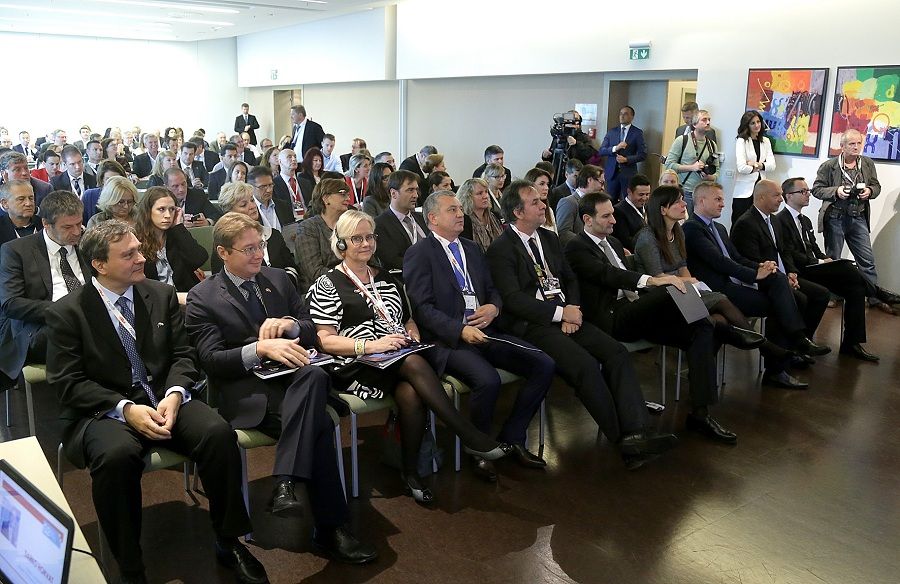
The conference will also be attended by businesspeople from the USA, Canada, Chile, Ecuador, Bolivia, Venezuela, Germany, Switzerland, Finland, France, Slovenia and Bosnia and Herzegovina. In addition to discussing investing in Croatia, this is also an opportunity for Croatian companies to strengthen their connections with other continents and countries and expand their export opportunities.
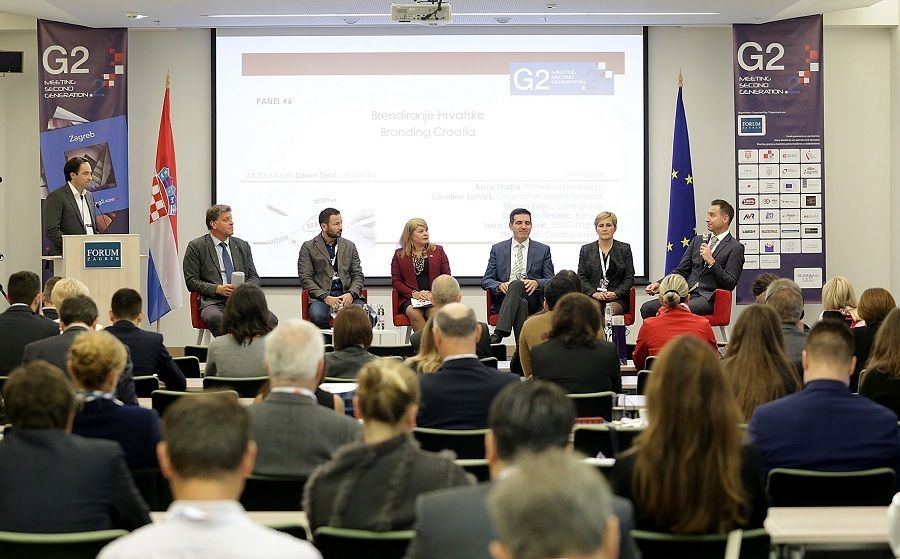
At the conference, the participants will take part in a varied programme of activities. The first day will see the "Pitch Session" which will present ten Croatian startups with the aim of obtaining financial support from businesspeople from around the world. The second day will bring seven discussion panels, with lots of opportunities for participants to meet and talk.
In the last few years, it has become obvious how important local chambers of commerce are for encouraging entrepreneurs to invest in Croatia. Therefore, one of the panels will discuss the Australian-Croatian chambers of commerce, which have achieved excellent results and contributed to Croatia's surplus in the trade exchange between the two countries. The panel on innovative design in the Croatian wood industry will present several companies which have achieved international success, such as Prostoria and Dizz Concept, which will share info on how they create added value through product branding.
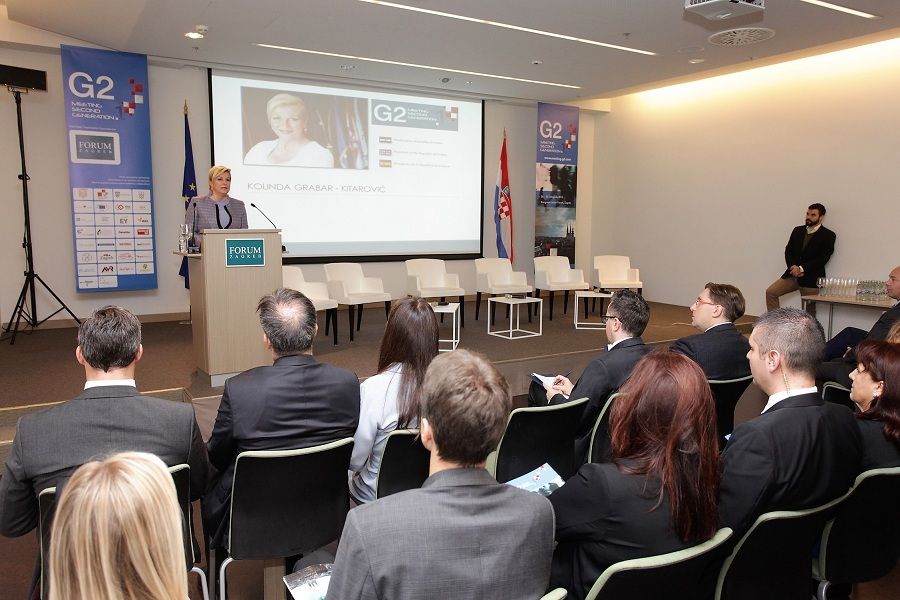
The panel on Croatian delicacies will present producers who have achieved major international success, which the wider public often knows little about. One of the participants will be Neb Chupin, the creator of the Dida Boža (Dalmatia) brand. At the panel on blockchain in Croatia, we will hear firsthand about the experiences of investing in blockchain projects and the latest global trends. One of the participants of the panel will be the crypto-investor and well-known entrepreneur Hrvoje Prpić. The conference will be closed by Nenad Bakić, an entrepreneur, investor and philanthropist, who will present the Croatian Makers project, which has achieved remarkable results over the last two years regarding the introduction of STEM activities in educational institutions and the local community.
The meeting-g2.com website brings more information about this year's programme and previous conferences, while all those interested can sign up to attend this year’s edition.
For more on the Croatian diaspora, click here.

